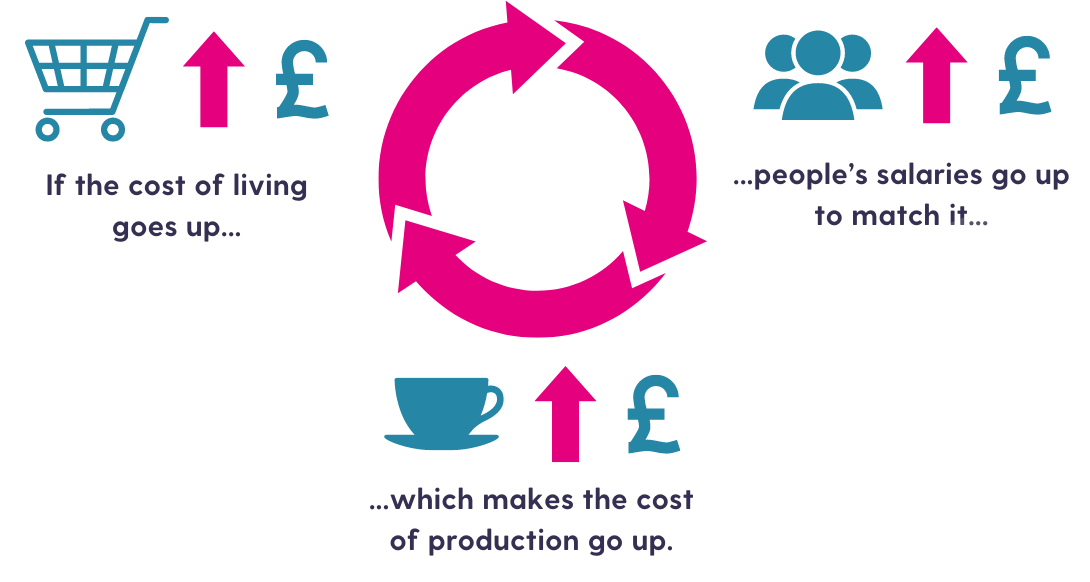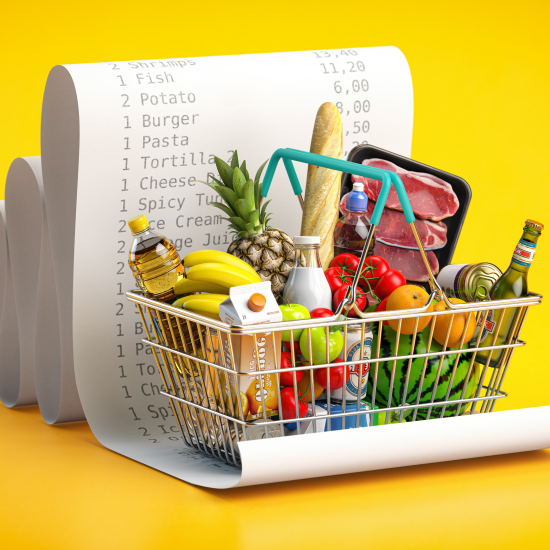What is inflation?
Inflation is simply prices going up over time. Inflation rate is how quickly this happens.
Of course, as prices go up, you can buy less with the same amount of money. So, understanding inflation can help you make sense of how the value of your money changes.
You can use this insight to decide what to do with the money you're putting away for the future, particularly if you're deciding between saving and investing.
In this guide, we're going to break down the mystery of inflation – what it is, its causes and the different types of inflation.
How does inflation work?
To put it simply, inflation is prices going up which means the value of your money goes down. You've probably noticed that you can buy less with £1 than you could a few years ago – that's inflation.
Inflation is normal, but when prices go up faster than wages increase, people become financially worse off.
How is inflation calculated?
Inflation is calculated by comparing the cost of things today to where they were a year ago. This is reflected as a percentage, also known as the ‘inflation rate’.
The Office for National Statistics (ONS) collects around 180,000 prices of roughly 700 items each month and uses this ‘shopping basket’ to work out the Consumer Prices Index (CPI). It compares CPI between years to measure inflation.
The UK government sets a target of 2% inflation, which means that it aims for prices to rise by 2% each year. When inflation is higher than this, it's judged as too high.
Effects of inflation
Rises in inflation can impact individuals and society. The main effects that you’d expect to see when costs go up are:
- Money not going as far as it used to.
- Not being able to save because money is needed for essentials, like rent and bills.
- Not being able to afford insurance, risking further financial problems.
- Businesses closing because they can no longer afford to stay open.
How could inflation affect you?

The most obvious impact of inflation is that the things you want to buy are more expensive so your money doesn't go as far. Your weekly shop probably costs more today than it did a year ago.
With less money, people can sometimes be tempted to cancel insurance policies, such as contents insurance or pet health cover, as they feel the money would be better spent on something else.
Unfortunately, this does mean that some people are finding themselves in difficult situations when something has gone wrong and they no longer have insurance to help them pay for it.
How does inflation rate affect interest rates?
Interest rates tend to increase when inflation rates go up. That's because central banks, like the Bank of England, increase interest rates to try and bring the inflation rate down. In theory, this makes borrowing less attractive which reduces spending and therefore reduces demand - bringing costs down.
Inflation can therefore impact how you save for the future. If your savings account is paying an interest rate that is lower than inflation, your money will be growing at a slower rate than prices are going up by. This is felt especially in the housing market, where house prices can increase quickly while you're trying to save a deposit.
So, in a year's time you might have more money than you started with but it might not be able to buy as much as it could do today.
Causes of inflation
Inflation tends to happen over time in most healthy economies. But inflation is speeded up by factors such as:

An increase in the supply of money
This is when households have more money so can spend more freely. However, the amount of goods available doesn't change – there's still the same number of carrots in Tesco, for example. Tesco can then put up the price of those carrots because the demand for them is higher than the supply.

Increase in wages
When companies pay their workers more, the cost of what they're selling tends to go up to cover the cost of paying staff.

The price of raw materials going up
As above, if companies need to pay more for materials to make goods, then they have to increase the cost of the goods they're selling so that they can still make a profit.

The price of energy going up
Again, this is related to how much it costs to product goods and services. When energy prices go up, it costs more to run a cafe for example, so a cafe owner might decide to increase how much they charge for a cup of coffee to cover the increase in the cost of heating the water.

Slowing down of productivity
This is where companies are producing less goods or services for the same cost. For example, a furniture company going from building 50 chairs a day to building 40 chairs a day. If the cost of wages stays the same then the cost of producing each chair is higher.
What are the different types of inflation?
Demand-pull inflation

Picture this, everyone in your town suddenly wants the latest gaming console. Demand for the console quickly goes up and, because everyone is competing for the limited supply, this causes the price to increase.
This is demand-pull inflation. When too many people want the same things, causing prices to go up.
Cost-push inflation

Now, imagine the cost of making your favourite meal goes up. Maybe there's a shortage of key ingredients or an increase in production costs. When companies have to pay more to make their products, they make up for this by charging you more to buy them.
That's cost-push inflation – when the cost of making things goes up which pushes prices higher.
Built-in inflation

Let's say you work at a pizza place and the cost of living goes up. To make up for it, your boss gives you a pay raise. But now, because they're paying you more, the pizza place needs to charge more for pizzas - so people are paying more for the pizzas and the cost of living becomes more expensive.
This cycle of rising wages leading to higher prices is called built-in inflation – the cost of production goes up, workers demand higher wages and prices rise to cover the cost of increased wages.
Inflation vs. deflation: What’s the difference?
Inflation is when the prices of goods and services go up. Deflation is the exact opposite of this, when those prices decrease.
Whilst on the surface deflation might sound like a good thing, but this isn’t the case. It can lead to reduced spending, which is bad for businesses and therefore the economy.
Learn about investing with OneFamily
As you start to get to grips with investing, OneFamily is here to answer your questions. Explore our Investing for Beginners hub for more guides to help you start investing with confidence.

Keep learning about finance
You may also be interested in:
Personal finance news
Read about the government schemes and benefits that many of our customers are entitled to.
Five ways to maximise your savings
When you’ve worked hard to put money away, how can you make the most of your savings and help your money grow in the background?
Common money mistakes and how to avoid them
While some money mistakes can be easy to correct, a moment of distraction can sometimes impact your financial wellbeing for years.
How to build an emergency fund
The best way to deal with the unexpected is to be prepared for everything. But how can you plan for what you don’t know - and how much do you need to save?
